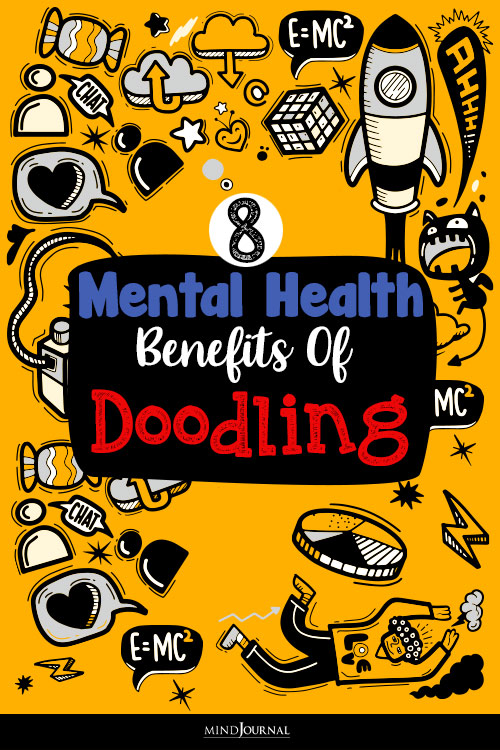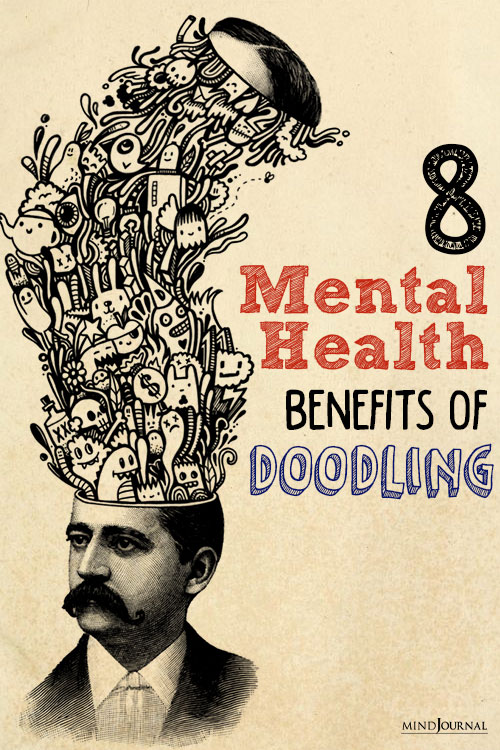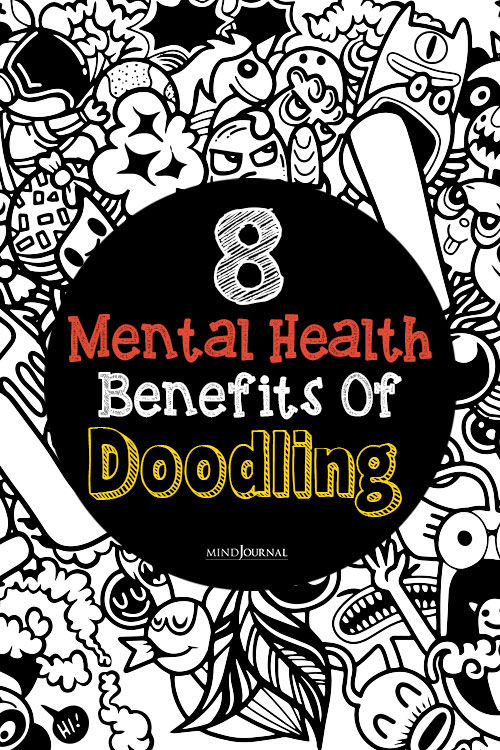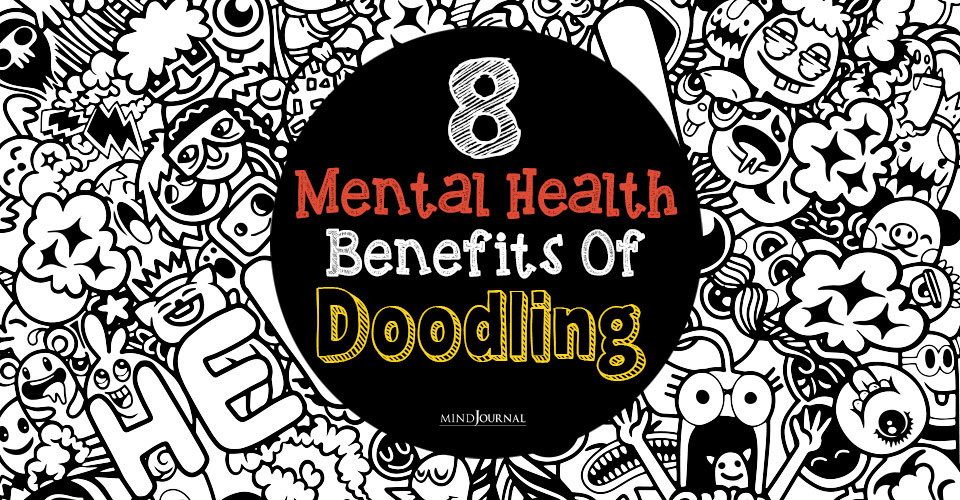The art of doodling is often seen as a waste of time, something you do when you’re bored or distracted. For example, suppose you’re attending a seminar or an important meeting, chances are you might have seen someone doodling while the speaker is busy speaking about something important.
You might have judged them at that moment, by considering them as insincere and disrespectful. But the truth is that doodling is not actually a useless habit, as most people tend to believe.
Doodling can be really therapeutic and can act as a form of stress release for whenever you feel overwhelmed or even, bored. Additionally, it has a host of mental health benefits and can help you deal with anxiety, tension, and other sorts of negative feelings.
8 Mental Health Benefits Of Doodling
1. It can boost your creativity.
Believe it or not, the art of doodling can help you be a more creative person in the long run. It helps you express yourself in unique ways, and gives you an outlet to realize your thoughts and emotions. Every little thing that you doodle on paper is a reflection of who you are and shows your artistic side. And not just this, it can also help you come up with solutions and ideas to things that you were stuck on for a long time.
Doodling basically engages the unfocus circuits in your brain and gives some much-needed rest to the focus circuits. This helps you be at your creative best, which then pushes you to solve all the problems that you have been dealing with. It can also help you polish your ideas more, especially the ones which you’ve already had. The ideas that are already swirling in your mind, you can doodle them and give them shape, and this can help you bring your ideas to life.
Express yourself through doodling, and see how many amazing ideas come to life right in front of your eyes.
Related: 15 Art Therapy Exercises to Banish Anxiety and Channel Your Emotions
2. It can help reduce your stress levels.
This one is probably a no-brainer. Doodling can help you cut back on your stress levels because it calms down your amygdala (the part of the brain that is responsible for the flight or fight response), which is associated with anxiety and stress, and helps you feel more relaxed and at peace. Moreover, research has proved that creative and artistic activities can make you feel less anxious, stressed, and impatient.
When you’re doodling, you’re making all sorts of lines, curves, and shapes on paper, over and over again. These repetitive movements help you to calm down and loosen up more. Furthermore, when you work on something, there is always a slight fear that you might make a mistake, but when doodling is concerned, that’s not the case. Since you’re only drawing lines and curves repeatedly, just in different ways, there’s hardly any scope for making mistakes.
3. It can make you feel happier.
Doodling doesn’t just make you more creative and relaxed, it can also make you feel happier. If you are in a bad mood, or something is making you feel overwhelmed and down in the dumps, and you choose to doodle something positive and happy, it can instantly uplift your mood. Studies have shown that doodling can really help you process your emotions better, and most importantly, in a healthy way.
Journaling is also an amazing way of understanding your thoughts and emotions, and if you add doodling to it, then there’s nothing like it. Adding doodles to your journal entries doesn’t only make your writings more lively, it also gives life to your emotions.
Related: 21 Different Art Therapy Exercises For Different Emotions
4. It can help you be a better learner.
Students who doodle during lectures or classes are always reprimanded for being inattentive and insincere by their professors. But the truth is the exact opposite. Students who engage in doodling are more likely to understand complex concepts in class and absorb and hold on to more information in their brains. So in a way, this practice can not just make you smarter, but also a better learner.
Doodling can also help you be more imaginative, attentive, and can help you deal with distractions in class. This whole process ends up with you enjoying what is being taught in the class, further pushing you to engage more with the study materials without thinking that it’s a bore.
5. It stops your brain from going into default mode.
When you’re paying attention to something, your brain is fired up and it works hard to make sure that all the auditory and visual information is sent to the right places. But what happens when you’re not paying attention? What does the brain do then? When your brain is sitting idle, it slowly slips into a default mode, where it waits for the next task to happen so that it can go back to doing what it does best: relaying information.
When you’re replaying memories in your head, or daydreaming about something, that is your brain in default mode. Even though there’s absolutely nothing wrong with doing either of these, sometimes you need to snap your brain out of it by disengaging it and at the same time focusing on external stimuli. In order to achieve this, doodling is the best way to go, as it stops your brain from going into default mode by keeping it engaged.
6. It can help with big-picture thinking.
You will notice that when you’re overly focused on something, you tend to overthink, and for the most part, you overthink negatively. You become pessimistic, apprehensive, and afraid. This causes you to heavily focus on the details which are not that important, but you just can’t seem to remove your mind from it. You end up missing the big picture and this just makes you more unhappy and anxious.
However, the art of doodling can help you break this one-dimensional way of looking at things; it pushes you to take a step back and link several broad concepts and ideas, leading to the bigger picture. Innovation becomes the name of the game when you come up with ideas taken from your subconscious or past memories and experiences, and use them to make connections that were never there before.
Related: How to Stop Being an Emotionally Repressed Person: Crying Therapy
7. It can make you a better listener.
When you feel yourself losing the thread of a conversation, or you find yourself bored out of your mind, then get straight to doodling. Doodling will make sure that there’s a right balance between listening to a lot, and not listening at all. It helps your mind to stay in place but also makes sure that it doesn’t think too deeply about all the information it’s getting. It helps you concentrate perfectly.
You will be able to listen to the other person properly without losing track of the conversation and with a lot of focus. When you doodle, you keep yourself in the present and force your mind to focus on what’s happening around you. Try this out to be a more involved and better listener!
8. It helps you deal with your emotions.
When you are anxious, overwhelmed, scared, or even depressed, it can be hard to express those feelings accurately. There’s so much going on within you that describing them or explaining those feelings can be extremely challenging. But doodling might be able to help you out with this. You might not be able to verbalize what you’re feeling, but you can express your state of mind through pictures or doodles.
When you doodle your emotions and thoughts on paper, you’re pouring out your heart and this makes it easier for you to understand what is it that you’re actually feeling. Verbalizing difficult emotions is not always an easy thing to do, so in order to process them in the right way, doodle them down on paper the next time you feel not-so-good about something.
Related: Jim Carrey Reveals Why He Got Obsessed With Painting In This Documentary: “I Needed Color”
So now you see how doodling is an incredibly good habit to have and how much it can actually help you and your mental health. The mental health benefits of doodling will always remain unparalleled. The next time you see someone doodle in the middle of a class or lecture, know that they are taking care of their mental health in the right way.











Leave a Reply
You must be logged in to post a comment.